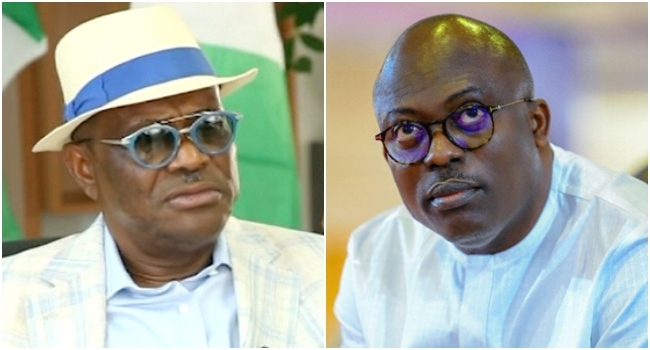The political landscape of Rivers State remains deeply fractured, as evidenced by the chaotic scenes that unfolded at a town hall meeting in Port Harcourt. Intended as a platform for dialogue and reconciliation among stakeholders, the meeting quickly devolved into a heated exchange between supporters of the Federal Capital Territory Minister, Nyesom Wike, and those aligned with the suspended Governor, Siminalayi Fubara. The clash laid bare the underlying tensions and power struggles that continue to grip the state, despite attempts to present a united front.
The catalyst for the eruption was a seemingly innocuous statement by Bright Amaewhule, President General of the Grassroots Development Initiative (GDI), a political group known for its close ties to Wike. Amaewhule asserted GDI’s instrumental role in Fubara’s gubernatorial ascent, claiming the group facilitated his acceptance across the state, even when facing opposition from those closest to him. This seemingly self-congratulatory remark ignited a firestorm of reactions, exposing the raw nerves and simmering resentments within the political arena.
Hilda Dokubo, the state chairman of the Labour Party and a staunch Fubara supporter, reacted vehemently to Amaewhule’s claims, initially storming out of the meeting in protest before being persuaded to return. The situation further deteriorated when Kenwell Ibanibo, another attendee, challenged the GDI’s narrative and directly questioned the attempted impeachment of Governor Fubara mere months after his inauguration. Ibanibo’s pointed inquiry, implicitly implicating Wike in the impeachment move, ignited a volatile exchange between the opposing factions. The meeting descended into a cacophony of shouting matches and accusations, with Wike loyalists and Fubara supporters engaging in a heated back-and-forth.
The atmosphere grew increasingly tense, requiring the intervention of security personnel to maintain order. The anchor of the event, civil society leader Jake Epelle, struggled to restore calm amidst the escalating confrontation. Ibanibo’s eventual decision to leave the stage temporarily de-escalated the situation, allowing the meeting to proceed, albeit under a palpable cloud of tension. However, this fragile peace was shattered once again when Niger Delta activist Ann-Kio Briggs was interrupted during her address by a Wike loyalist, reigniting the cycle of interruptions and rebuttals.
Briggs’ firm response, asserting her right to speak regardless of affiliations, further underscored the deep divisions and the lack of genuine communication among the stakeholders. The repeated flare-ups throughout the meeting highlighted the fragility of any purported reconciliation efforts and the lingering bitterness stemming from the power struggle within the state. The open animosity between the two camps suggests that the underlying issues remain far from resolved.
The town hall meeting, intended to foster dialogue and unity, instead became a stark illustration of the deep-seated political rifts within Rivers State. The incident underscores the challenges facing any attempt to bridge the divide between Wike and Fubara’s supporters. The ongoing tensions and the ease with which disagreements escalate into open confrontation suggest a protracted and complex political struggle lies ahead. The meeting, rather than fostering understanding, exposed the raw emotions and fiercely held loyalties that continue to shape the political landscape of Rivers State. The path to true reconciliation remains uncertain, overshadowed by the volatile dynamics and entrenched rivalries that were so vividly displayed during the town hall meeting.














